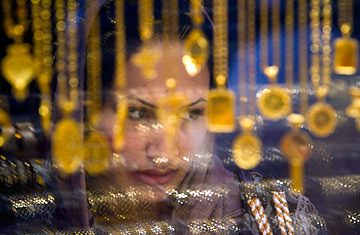
An Iranian-Kurd woman looks at jewellery while shopping at a bazaar in Marivan in Kordistan province, 318 miles west of Tehran, May 12, 2011.
Correction appended June 8, 2011
Judging by the front pages of Persian language newspapers neatly laid out at every Tehran newsstand, political scandal is in the air. President Ahmadinejad's closest aides, including right-hand man Esfandiar Rahim Mashaei, are being accused of embezzlement, cronyism, collaboration with opposition forces, and even pagan rituals thrown in for shock value. Parliament Speaker Ali Larijani, recently re-elected by a wide margin to his position by fellow members, asserted in public, "I wish for a strong Parliament" — a barely coded attack on the executive branch and the President himself. Supreme Leader Ali Khamenei discouraged the quarreling after an earlier rebuke of the President, telling the Parliament that government officials should "prevent differences of opinion and diversity in taste which result in challenge and conflict." The President, seemingly confident and ascendant only months ago, could end up a lame duck for the remainder of his term as his conservative rivals in the Parliament seem to be planning to use the March 2012 parliamentary elections to increase their checks on his power.
Most Iranians, however, seem unconcerned with the political brawls among the revolutionary elite. They've seen these battles before. And they will see them again. What occupies the ordinary citizen nowadays is money. Next to the same newsstands in Tehran is a sparkling branch of one of the eight new banks that have opened in the past year, with names like City, Tourism, Tat, and Ansar Bank. These branches join an already crowded field of consumer banking in Iran, competing for deposits by offering prizes such as cars, trips to Dubai, and household appliances to new account holders. The Iranian Central Bank dictates the interest rates of all banks, whether public or private, so these businesses are forced to lure customers with what is essentially a huge raffle. It might just be fitting that one of Tehran's leading theater companies is opening a new Persian language production of David Mamet's Glengarry Glen Ross this month — a play about the moral depths individuals sink to when profit is pursued over all other considerations.
One account manager in an established public/private bank was not happy about the new upstarts on most main streets. "There is too much competition now," she exclaimed. But tens of millions of Iranians are presently receiving monthly payments from the Iranian government, as compensation for higher prices due to the reduction of the government's energy and food subsidies — and the money has to go somewhere. For a few weeks in April the cash went into the gold market, sending domestic gold prices in Iran soaring well above already astronomical global prices. Housewives and speculators with free time tried their luck in the boom market in gold coins — which Iranian families use as investments as well as wedding dowries — until the Central Bank intervened and brought the price down.
Most individuals seem to be able to receive the new government payments of $40 a month per person rather easily, though to be able to do so they have to fill out paperwork. One retired woman preferred to forego the process, uttering a sentiment occasionally heard by Iranians whenever forms are involved: "If you want to get the payments, you need to fill out the form and give the government all kinds of information, including your income. And if you tell them your income, it won't be long until they come and tax it." Nevertheless, it was reported in the local press that 2 million Iranians residing outside the country are receiving cash payments. Even if this figure is exaggerated, it symbolizes the relative accessibility of the economic program for the citizenry.
The summer months will be a more serious test for the Islamic Republic's energy reforms, as electricity bills will be far less subsidized than previous years. Even more alarming for Iranians is that they are now expected to pay the bills on time, upending a long-held custom of going months without paying for utilities with little penalty or threat of switching off water and electricity. Just as with the taxman, it is getting harder for Iranians to evade other government bureaucracies as well.
Until the weather seriously heats up, Iranians can allow themselves to be entertained by politics. While the headlines may be bold, most Iranians have become accustomed to political infighting over the lifetime of the Islamic Republic, including attempts by Presidents to save their political careers by sacrificing close members of their cabinets and inner circles. During President Hashemi Rafsanjani's administration (1989-1997), his main advisor and Minister of Economy and Financial Affairs Mohsen Nourbakhsh was voted down for a second term in the Cabinet by a Parliament that was vociferously opposed to Rafsanjani's economic policies. President Mohammad Khatami (1997-2005) watched as a close supporter, the powerful former Tehran mayor Gholamreza Karbaschi, was tried for corruption by the conservative establishment. And it is this very establishment, older but no less formidable, that is now railing against President Ahmadinejad's executive overreach and mishandling the country's economy over the past several years. Revolutionary allies turned rivals is a repetitive drama in Iranian politics.
Of course, when elites clash in Iran, and accusations of malfeasance and corruption emerge, the public usually benefits from the brief moments of clarity that arise when competing political factions leak and insinuate all sorts of scandalous and titillating news to attack each other. If the President continues to shake the hornets' nest by refusing to cede oversight and administrative power to the Parliament, then the fireworks show will continue. For most Iranians, however, this simply confirms what they already know about their country's politics. If it touches their pocketbooks, however, that may be another matter entirely.
Correction: The original version of this story said that Mohsen Nourbakhsh was impeached. He lost a vote of confidence.
